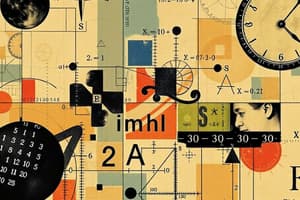Podcast
Questions and Answers
Which of the following mathematical concepts is NOT a key area within the broader field of mathematics?
Which of the following mathematical concepts is NOT a key area within the broader field of mathematics?
- Philosophy (correct)
- Geometry
- Algebra
- Arithmetic
In algebra, what does a variable typically represent?
In algebra, what does a variable typically represent?
- An unknown quantity (correct)
- A mathematical operation
- A known quantity
- A fixed numerical value
Which mathematical concept focuses on the study of relationships between shapes, sizes, positions, and properties in space?
Which mathematical concept focuses on the study of relationships between shapes, sizes, positions, and properties in space?
- Calculus
- Arithmetic
- Geometry (correct)
- Algebra
In calculus, what is the primary focus of differential calculus?
In calculus, what is the primary focus of differential calculus?
Which of the following is NOT a measure of central tendency used in statistics?
Which of the following is NOT a measure of central tendency used in statistics?
What is a key concept in discrete mathematics that involves the study of counting, arrangements, and combinations?
What is a key concept in discrete mathematics that involves the study of counting, arrangements, and combinations?
Which of the following is an example of a geometric solid?
Which of the following is an example of a geometric solid?
What type of equation relates one variable to another through a linear relationship?
What type of equation relates one variable to another through a linear relationship?
Which of the following best describes deductive reasoning?
Which of the following best describes deductive reasoning?
Which of the following is NOT an application of mathematical reasoning?
Which of the following is NOT an application of mathematical reasoning?
What is the significance of mathematical modeling in real-world applications?
What is the significance of mathematical modeling in real-world applications?
Which of the following is NOT a benefit of mathematical proofs?
Which of the following is NOT a benefit of mathematical proofs?
How does mathematics contribute to advancements in technology?
How does mathematics contribute to advancements in technology?
Flashcards
Deductive Reasoning
Deductive Reasoning
A logical process that moves from general principles to specific conclusions.
Inductive Reasoning
Inductive Reasoning
A logical process that moves from specific observations to general conclusions.
Mathematical Proofs
Mathematical Proofs
Logical arguments that confirm the truth of mathematical statements or theorems.
Mathematical Modelling
Mathematical Modelling
Signup and view all the flashcards
Applications of Mathematics
Applications of Mathematics
Signup and view all the flashcards
Mathematics
Mathematics
Signup and view all the flashcards
Arithmetic
Arithmetic
Signup and view all the flashcards
Algebra
Algebra
Signup and view all the flashcards
Geometry
Geometry
Signup and view all the flashcards
Calculus
Calculus
Signup and view all the flashcards
Statistics
Statistics
Signup and view all the flashcards
Central Tendency
Central Tendency
Signup and view all the flashcards
Discrete Mathematics
Discrete Mathematics
Signup and view all the flashcards
Study Notes
Fundamental Concepts
- Mathematics is a system of logic and reasoning used to quantify, describe, and model the world around us.
- It encompasses various branches, each with distinct concepts and methods.
- Key areas include arithmetic, algebra, geometry, calculus, and statistics.
- Mathematics relies on axioms and theorems, forming a logical framework to derive new results from established ones.
- Mathematical symbols and notation are used to represent concepts and relationships precisely.
Arithmetic
- Arithmetic deals with basic operations: addition, subtraction, multiplication, and division.
- It forms the foundation for all other mathematical branches.
- Properties like commutativity, associativity, and distributivity govern these operations and simplify computations.
- Whole numbers, integers, fractions, and decimals are fundamental concepts in arithmetic.
Algebra
- Algebra extends arithmetic by introducing variables and equations.
- Variables represent unknown quantities.
- Equations relate these unknowns to knowns, allowing for their determination.
- Different types of equations (linear, quadratic, etc.) are solved using specific methods.
- Algebraic expressions can be manipulated according to established laws.
Geometry
- Geometry studies shapes, sizes, positions, and relationships in space.
- Key concepts include points, lines, angles, polygons, circles, and solids (e.g., cubes, spheres).
- Geometric theorems describe relationships between these shapes.
- Constructions and proofs are crucial to validating geometric results.
Calculus
- Calculus deals with change and motion.
- Differential calculus investigates rates of change, using derivatives.
- Integral calculus deals with accumulation of quantities, using integrals.
- Applications include modelling physical phenomena (e.g., motion, growth, and decay).
- Concepts include limits, continuity, and differentiability.
Statistics
- Statistics analyses data and draws inferences.
- It involves collecting, organizing, summarizing, and interpreting data sets.
- Measures of central tendency (mean, median, mode) and dispersion (variance, standard deviation) describe data characteristics.
- Probability assesses the likelihood of outcomes.
- Statistical methods are used to test hypotheses and make predictions.
Discrete Mathematics
- Discrete mathematics focuses on countable objects like sets of integers and graphs.
- Topics include combinatorics (counting), graph theory, logic, and number theory.
- It has numerous applications in computer science, operations research, and other fields.
Mathematical Reasoning
- Deductive reasoning proceeds from general principles to specific conclusions.
- Inductive reasoning proceeds from specific observations to general conclusions.
- Problem-solving is a key skill in mathematics.
- Mathematical proofs demonstrate the validity of theorems.
- Mathematical modelling involves representing real-world issues using mathematical concepts to predict and understand phenomena and their relationships.
Applications of Mathematics
- Mathematics is fundamental to numerous scientific disciplines (e.g., physics, chemistry).
- It plays a crucial role in engineering, finance, and computer science.
- Mathematics powers advancements in technology and drives progress in many fields.
Studying That Suits You
Use AI to generate personalized quizzes and flashcards to suit your learning preferences.




